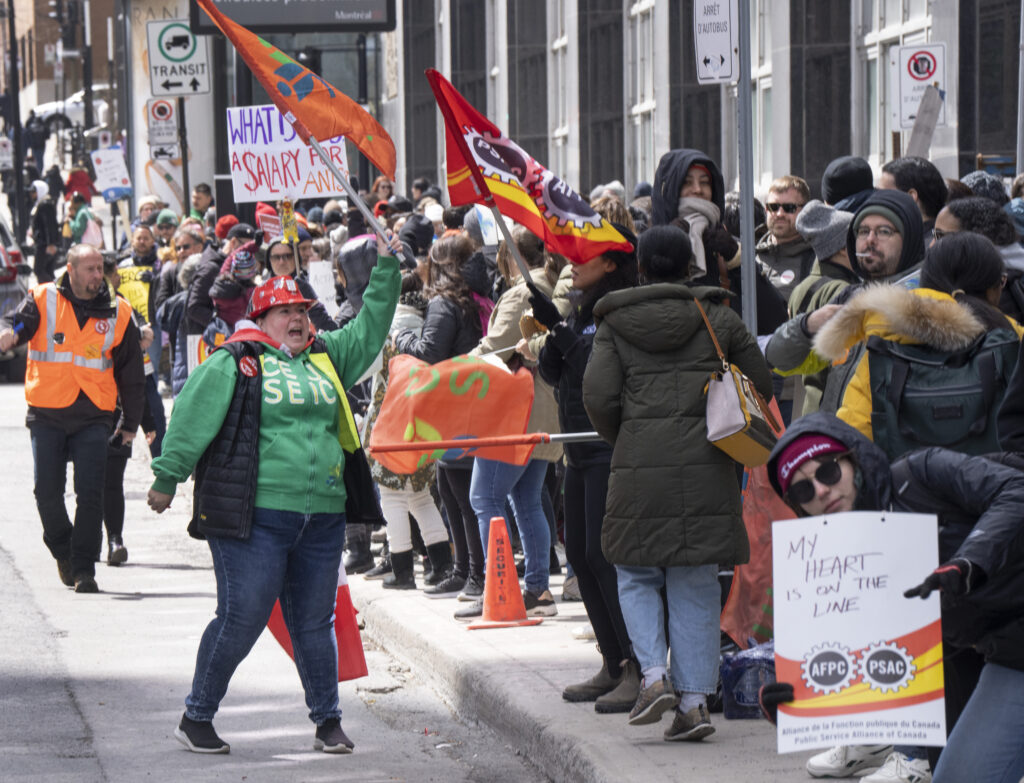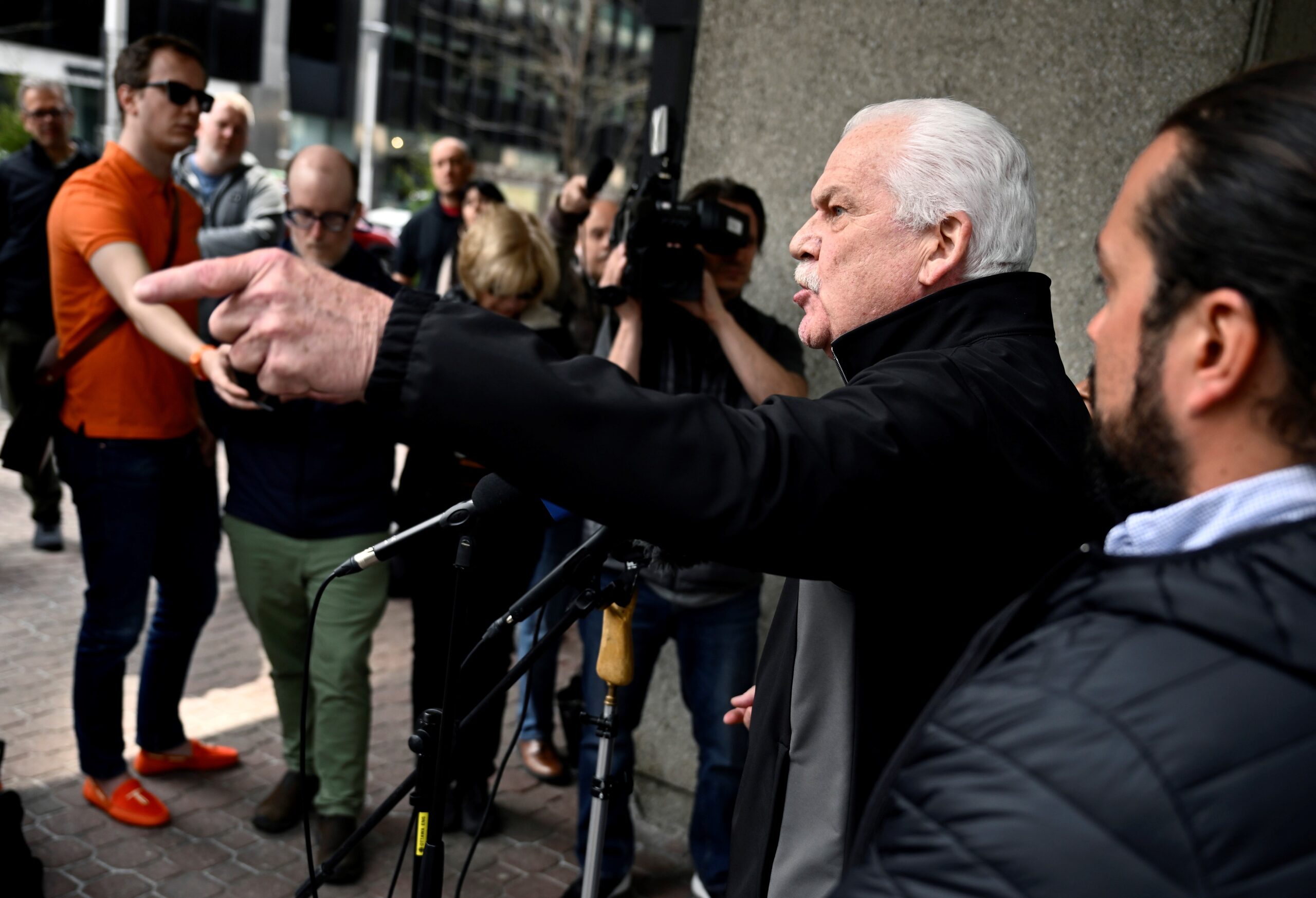
Updated Monday, April 24.
OTTAWA – The historic strike by 155,000 federal public servants is being watched closely by unions across the country looking for breakthroughs on pay and especially the thorny issue of the right to work remotely.
“I think this strike could be momentous, not because of wages but because of the future of work and employment,” said Ian Lee, an associate professor of management at Carleton University’s Sprott School of Business.
Negotiators for the Public Service Alliance of Canada (PSAC) and the federal government were at the bargaining table through the weekend seeking a deal to end the strike that started Wednesday. Wages, remote work and seniority rights for layoffs are still the main sticking points in the way of a deal.
PSAC, however, is ramping up strike action with work stoppages that could hit the economy. Union officials say that could mean targeting ports, rail, grain elevators, inspection points – anything that could slow trade and affect the economy. PSAC President Chris Aylward said the escalation is aimed at pressuring the government to speed up the pace of negotiations and get a deal.
“This government seems content to prolong this strike and its impact on Canadians by dragging out negotiations. Our members are frustrated by the government’s lack of progress at the table this weekend, and that’s why we may need to escalate our actions,” Aylward said.
The escalation comes after a very public squabble between PSAC and Treasury Board earlier in the weekend, each heaping blame and accusing the other of stalling talks and spreading misinformation. PSAC accused Treasury Board Minister Mona Fortier of “incompetence” and demanded the prime minister step in.
At the bargaining table, wages are the top priority and a big sticking point in this high-pressure round of talks, but remote work is close behind and could end up being a deal-breaker.
Labour observers say if a deal isn’t reached early in the week, the strike could drag on. A separate round of mediated talks with the Canada Revenue Agency and PSAC stalled and are on pause. Other veteran negotiators say a strike gets harder for unions to maintain as it goes on. It is “easy to get (workers) out, harder to keep them there,” said one.
The impact of any potential PSAC settlement would be far-reaching. It sets a pattern for raises for all federal public servants, one that is sometimes followed for unionized workers in the provinces, territories and municipalities.
The union wants a raise that covers inflation and protects worker purchasing power. PSAC is demanding 13.5 per cent over three years; the government is offering nine per cent over three years. Treasury Board also struck deals with two other unions for 10.5 per cent raises over four years, setting the increase the government would likely accept.
A list of issues, but money first
PSAC has a pile of other demands on top of wages, such as overtime, additional leave, wage adjustments and allowances. Treasury Board officials say none of those issues can be resolved until they agree on the wage increase.
On remote work, the two sides have dug in their heels and made their positions very clear. Treasury Board President Mona Fortier has said from the start – and repeated this week – that location of work is a management right and the government isn’t giving it up. In short, it’s not negotiable.
PSAC President Chris Aylward has said he would not trade wages for remote work. That could be a problem for PSAC members, including 100,000 office workers in the Treasury Board group and the 39,000 CRA employees on strike. Many of them are unhappy with the government’s return-to-office order and want more flexibility.
PSAC could be in pickle by raising expectations for remote work in collective agreements while being unwilling to make concessions on money. It’s a promise one long-term union leader describes as “something it knows is going to be extremely difficult for the other side to give you.”
The union also has to satisfy two tiers of workers. About half of the public service needs to be face-to-face in the workplace to do their jobs. They include about 20,000 of those who are on strike. Operational and technical workers don’t care about remote work. Some are significantly underpaid compared to their counterparts in the private sector and want a pay boost on top of any general wage increase.
“If remote work becomes a deal-breaker, and it looks like it might, it is going to get in the way of people who, frankly, can’t take advantage of working at home and aren’t striking about that,” said one senior federal official who is not authorized to speak publicly.

But Lee feels the strike boils down to both wages and remote work. Finance Minister Chrystia Freeland has made clear the offer on the table is fair and the government can’t meet the union’s demand. Lee said this leaves remote work as potential ground for compromise.
He argues the government would be “annihilated in the court of public opinion” if it offered a double-digit wage hike. It would feed the Conservatives’ attack on the government as huge spenders and bad managers and undermines the Bank of Canada’s warning to avoid inflation-fueling large wage increases.
“If PSAC isn’t willing to trade on remote work for lower wages then it might be on strike for a long time,” said Lee.
A strike to set new landmarks?
The last big strike in 1991 gave public servants iron-clad job security and all eyes on are what landmark gains, if any, can be made this time.
The current dispute challenges the traditional public service hierarchy after the pandemic gave federal employees a taste of controlling their time and job location for the first time. They also saved money on commuting, child care, lunches and other costs. They don’t want to give up the effective pay raise.
The return-to-work pushback stoked what PSAC called an “overwhelming” strike vote it needed to strengthen its hand at the bargaining table.
A recent labour board decision into the irregularities during PSAC’s strike vote revealed only 35 per cent of some 100,000 office workers voted for strike. Of those, 85 per cent voted to strike. PSAC had kept those numbers from public view until the ruling.
Low turnout raises questions about how committed workers will be if this strike drags on.
The irony is not lost on many striking workers that they are fighting for the right to work from home by being forced to appear in person on picket lines at the office.
Already, some within the labour movement argue PSAC made a strategic mistake by organizing the strike around old-fashioned picket lines rather than find new innovative ways to mobilize people remotely to put pressure on the government.
“If you’re on strike, it sits poorly that for $75 a day you have to do what you don’t want to do, which is go to the office to go on a picket line,” said a union official.
Lee said the low turnout puts additional pressure on the union to compromise.
PSAC wants the right to remote work enshrined in all collective agreements. It is seeking a process with guidelines for deciding who can work remotely that workers can potentially challenge.
Management would have to surrender its right to decide how and where employees work, and would have to agree to the guidelines and process. It could have a huge impact on operations and services.
Another federal official said it would swamp government with grievances, throwing “sand in the gears” of an already slow-moving bureaucracy.
The Functionary: Subscribe to Kathryn May’s newsletter on the public service
The public service’s biggest disruption in decades: hybrid work
“Every collective agreement across the country is all about the employer deciding where and how work is done. To make that kind of headway, they will have to break that, and that will truly be ground breaking. You can bet it is being watched closely by lots of other unions,” said a long-time negotiator.
But sources say the government seems willing to open remote work for further study with PSAC as part of any settlement. The existing telework policy hasn’t been overhauled since 1999. Lee said an agreement for a working group or study to develop a new framework could be negotiated without Treasury Board giving up management rights.
The shift from clerks to knowledge workers
The public service has transformed since the 1991 strike from a workforce dominated by clerical and operational workers to being 48 per cent knowledge workers who mostly spend their time front of computer screens and could do their jobs anywhere. Lee said that shift is “irreversible.”
Robert Hickey, director of employment relations programs at Queen’s University, predicts a new framework will create a “mechanism or pathway for individual or department-based remote work arrangements.”
“A new framework for working from home would be significant, but I don’t know that I would call it a fundamental game changer,” Hickey said. “The game changer came from COVID. Now we’re just trying to figure out what the new normal is.”
Lee said any new framework will have to set guidelines on who works from home, but also how often they make office appearances. Public servants will also have to accept online surveillance and monitoring. “There has to be checks and balances. Just because you are a remote worker doesn’t mean you are now immune from supervision,” he said.
Remote work opens a can of worms neither the government nor union are ready to address in this round of bargaining. What happens to the value of work? How does it affect the 7.5-hour work day, overtime, call-backs, meal allowances and other and pay? How are employees accountable for productivity and performance and how do managers handle discipline when workers no longer report to the office?
Then there is the whole issue of “two-tier employment” when employees who can’t do their jobs remotely will expect to be paid a premium.
With a new framework, Lee argues a new collective agreement could set a precedent for remote work that all employers will watch closely.
“It would meet the immediate needs of ending the strike, but it could be a landmark precedent,” he said. “The trend for remote work is not going away and it’s only going to accelerate.”
This article was produced with support from the Accenture Fellowship on the Future of the Public Service. Read more of Kathryn’s work here.










